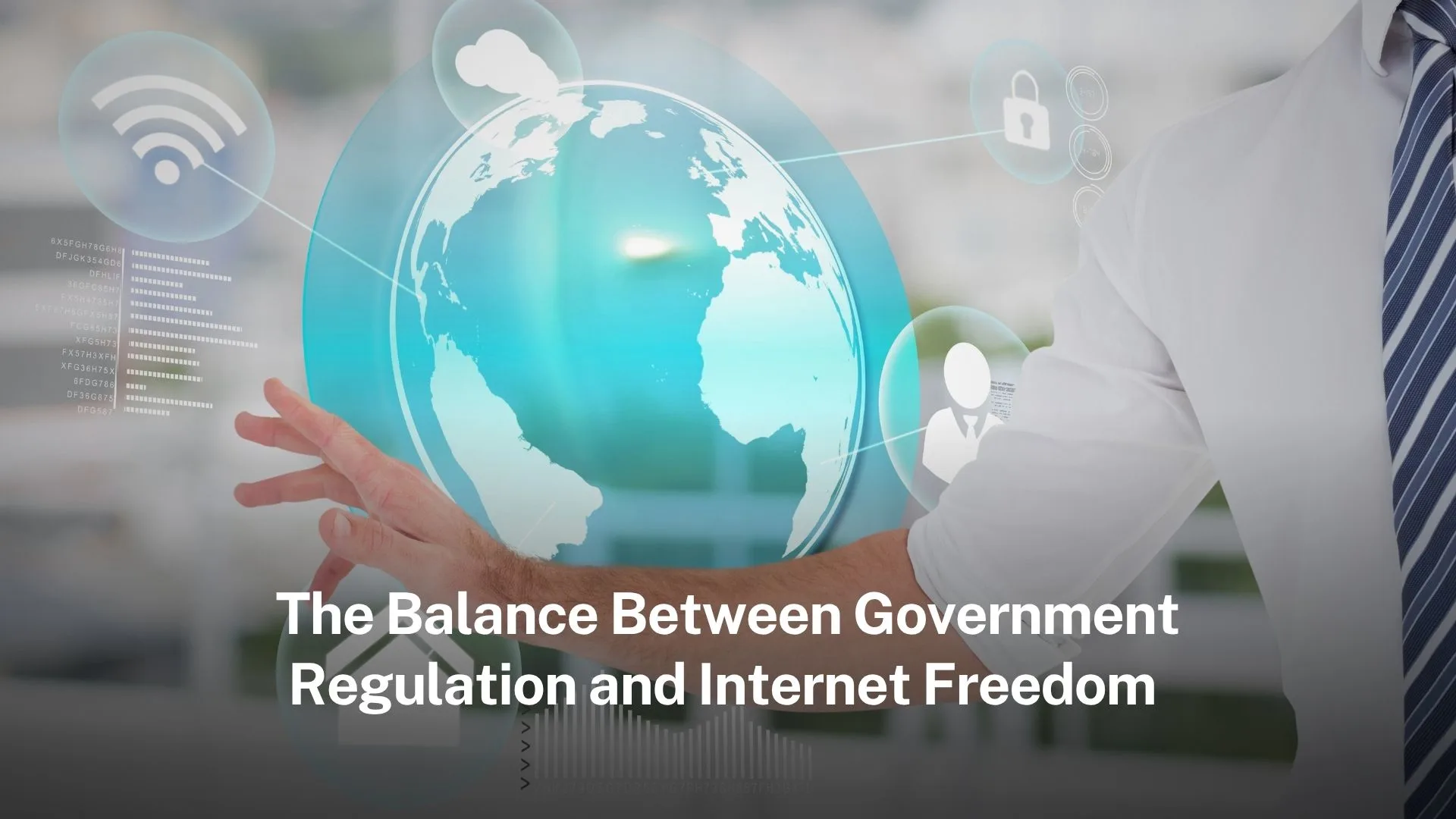Table of Contents
ToggleFinding a balance matters a lot. This balance involves government oversight. It also involves people’s freedoms on the internet. This issue is one of the most heated debates. The digital age makes this debate more important.
People who support internet freedom have their points. They say too much regulation is bad. It weakens democracy. It harms innovation. It also invades people’s personal privacy.
The internet has become a must-have tool. It is very important for modern life. It shapes how economies work. It influences social movements. It also changes political situations. The internet has grown very fast. This fast growth has brought new problems. Government regulation is a big problem. Some people think a certain way. They say government supervision is necessary. It keeps people safe. It makes sure things are secure. It helps things stay fair. Other people think differently. They believe too much regulation is dangerous. It puts freedom of speech at risk. It threatens privacy. It also slows down innovation.
This article looks at a tricky balance. The balance is between government regulation and internet freedom. It explores why each side thinks the way it does. Both sides are part of the debate. It also checks the possible results. These results affect users everywhere. They also affect industries around the world.
Governments have their reasons. They say regulation is necessary. It stops illegal things from happening. It protects citizens. It makes sure businesses compete fairly. There are some key areas. Governments think they must step in these areas.
1. Cybersecurity and Online Safety
There is one main reason. It makes governments regulate more. Cyberattacks are becoming a bigger threat. Online fraud happens more often. Hacking cases are increasing. Governments have a duty. They must protect citizens. They must also protect businesses. These risks make them act. So they make stricter rules. These rules target online platforms.
The European Union started GDPR. This happened in 2018. GDPR has clear goals. It protects people’s personal data. It sets stricter punishments. These punishments are for data leaks. Technology keeps changing. Governments want more action. They need stronger cybersecurity laws. These laws protect important infrastructure. They also make online transactions safe.
2. Combatting Hate Speech and Misinformation
There is another big reason. It pushes governments to make more rules. Hate speech needs to be stopped. Extremism must be dealt with. False information spreads on the internet. This spread needs to be controlled. The internet works across the world. Harmful content can cross borders easily. It can hurt millions of people. Governments are doing something. They are putting pressure on tech companies. They want companies to deal with certain content. Fake news is one target. Misinformation is another. Online hate speech is also targeted.
The UK has made the Online Safety Bill. The EU has created the Digital Services Act. These plans have a purpose. They control harmful content. They make online platforms take responsibility. Platforms are in charge of what people share. Governments believe one thing. Regulation can make the internet safer. It can also make the internet more responsible.
3. Protecting Economic Interests
Governments have another goal. They regulate the internet to protect local industries. They also want fair competition. The US gives an example. It has antitrust laws. These laws are made for one thing. They stop companies from having too much power. Such power hurts free-market competition. Some countries depend a lot on tech economies. China and Russia are two such countries. They have made their own laws. These laws control the digital space. They also censor it. They often say national security is the reason.
Many experts and activists think differently. They say government regulation can go too far. It threatens people’s rights. It puts freedoms in danger. The internet has been a special platform. It helps innovation grow. It lets people speak freely. It drives social changes. Too much government control may take these freedoms away.
4. Censorship Concerns
People criticize excessive regulation for one main thing. It can lead to censorship. Some countries have strict governments. China and Iran are examples. Internet censorship is common there. Social media platforms are closely watched. People who disagree are often silenced.
Governments have an excuse for this. They say it is to keep society stable. Critics have a different opinion. These actions stop free speech. They hold back political opposition.
China’s “Great Firewall” is a clear example. It shows how the government controls the internet. Some content is blocked. Some content is changed. These actions serve political needs. This makes people ask questions. Will democratic countries regulate more?
5. Privacy and Surveillance Issues
Government regulation brings another worry. It affects people’s privacy. More government supervision may lead to surveillance. It may lead to tracking. People’s online activities could be watched. Many countries are asking for something. They want ways to get into encrypted messages. This would let them monitor users. Users would not agree to this.
The US has a controversial debate about encryption. The UK has the Investigatory Powers Act. People call it the “Snooper’s Charter.” These things have made people alarmed. They are worried about privacy being violated. Critics have a point. Government surveillance damages a basic right. That right is privacy. It makes people not trust the government.
6. Stifling Innovation
Too many rules can cause harm. It hurts innovation. The tech industry feels this more. Many successful tech startups have grown well. They did this in an environment. The government did not interfere much there. This let them try new things. They could grow. They could change the digital world. Stricter rules could bring problems. Businesses have to follow these rules. This is a burden. Smaller companies are hit harder. They do not have enough resources. Dealing with complicated laws is hard for them.
The EU’s Digital Markets Act (DMA) is an example. It makes strict rules. Big tech companies like Google and Facebook are targeted. The goal is clear. It wants to stop companies from having too much power. Critics think differently. These rules could slow down competition. They make it hard for smaller companies. New companies may struggle to compete. The digital world is where they fight for success.
This debate is not simple. Tech companies have an important role. Many of them want to regulate themselves. They ask for more transparency. This transparency covers two things. One is how they manage user data. The other is how they enforce content rules. Some people think this way. Companies like Facebook and Google have a duty. They must stop hate speech. They need to deal with misinformation.
Corporate Responsibility and Self-Regulation
Tech companies have a special chance. They can act as a link. They connect governments and users. They can set up systems. These systems are strong. They focus on checking content. They can protect data privacy. Doing this helps find a balance. Freedom and regulation are the two sides. Critics have a different view. Many of these companies care more about money. They care less about users’ well-being. This can lead to censorship. It may also lead to unethical data use.
The Power of Algorithms
There is another controversial issue. It is about the role of algorithms. Algorithms decide what content users see. Many social media platforms rely a lot on algorithms. Their goal is to make users more engaged. These algorithms can cause issues. Sometimes they promote harmful content. They may create echo chambers. These echo chambers make misinformation spread more. Governments and regulators want change. They want more clarity about these algorithms. The goal is to protect users. Users should not be tricked. They should not get wrong information.
How to balance government regulation and internet freedom?
The answer is not easy. There are some possible ways to solve it.
1. Regional Regulation
Rules made for specific regions could be better. The EU’s GDPR is a good model. It allows more targeted regulation. It also respects users’ rights. Other regions can follow this. They can make their own policies. These policies fit their local needs. They still work with other countries.
2. Collaboration Between Governments and Tech Companies
Working together can get good results. Governments need to work with tech companies. Civil society should join too. This teamwork can create rules. These rules protect users. They do not stop innovation. Open talks are needed. Policymakers and tech companies talk openly. They can find solutions. These solutions balance different things. Security is one. Privacy is another. Freedom of speech is also included.
3. Emphasising Transparency and Accountability
Any rule needs one important quality. It must be transparent. Governments have a responsibility. Tech companies do too. They should be held accountable. They need to answer for how they implement rules. They also need to answer for how they enforce them. Independent supervision helps. Regular checks are useful. They make sure the balance is kept. Regulation and freedom are the two ends of the balance.
FAQs
1. What is government regulation of the internet?
Government regulation has a clear meaning. It refers to laws and policies. These are made to manage how the internet works. They cover many issues. Data privacy is one issue. Cybersecurity is another. Online content checking is also included.
2. Why do some people oppose government regulation of the internet?
Critics have clear reasons. Too much regulation can lead to censorship. It may break privacy rules. It can slow down innovation. The internet gives people freedoms. These rules limit those freedoms.
3. How can government regulation affect freedom of speech?
Too many rules can have an effect. They can lead to censorship. Governments control certain things. They decide what people can say online. They limit what people can share. This may go against free speech.
4. What role do tech companies play in internet regulation?
Tech companies have a central role. They control online content. They manage user data. They make decisions. These decisions are about implementing government policies. They also cover self-regulation methods.
5. Can we achieve both security and internet freedom?
Yes, it is possible. We can find a middle way. Working together is key. Governments and tech companies cooperate. They can make rules. These rules protect users. They also keep internet freedom.



Love how you highlight the good in people through your incredible creative work